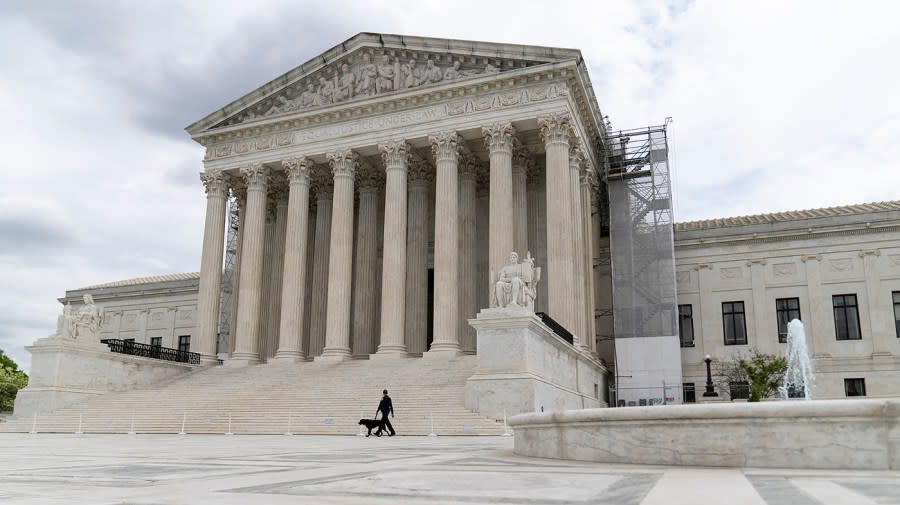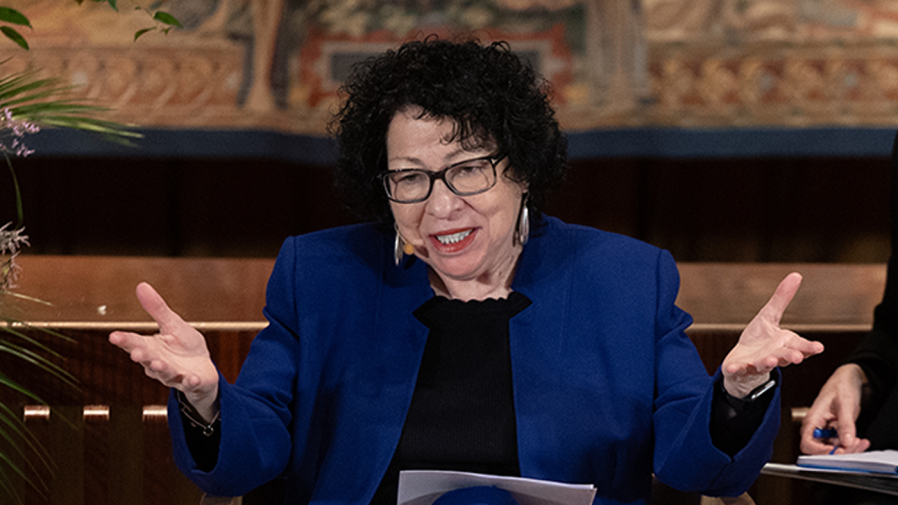Supreme Court appears open to some presidential immunity for Trump, risking delays

Justices on the Supreme Court voiced skepticism Thursday to assertions from former President Trump’s attorneys that presidential immunity could extend to an attempted coup or the assassination of a political rival, even as they seemed ready to offer some protections from criminal prosecution.
Such a ruling could create a new cycle of legal battles that in turn could delay Trump’s federal election subversion trial — and his other trials — past the election.
Conservative and liberal justices alike peppered Trump’s counsel with hypothetical situations, asking how far the former president’s claim of sweeping immunity protections would go.
Chief Justice John Roberts asked whether a president could be prosecuted for accepting a bribe for appointing someone to an ambassador post, while liberal Justice Elena Kagan asked whether a president selling nuclear secrets would have immunity.
Fellow liberal Justice Sonia Sotomayor asked if “fundamentally evil” actions such as ordering the military to take out a political rival would be protected by presidential immunity.
D. John Sauer, who argued the case on behalf of Trump, said most of the hypotheticals could plausibly fall under the standard for presidential immunity.
“That well could be an official act,” Sauer responded to Sotomayor’s scenario.

Justice Ketanji Brown Jackson, another of the court’s liberals, questioned whether Trump’s arguments would essentially make the presidency a lawless office.
“I’m trying to understand what the disincentive is from turning the Oval Office into, you know, the seat of criminal activity in this country,” Jackson said.
Trump is asserting that a president has absolute immunity for official acts while in office, and that this immunity applies after leaving office. He and his counsel argue the protections cover his efforts to prevent the transfer of power after he lost the 2020 election.
If the court agrees with Trump, many of his criminal indictments could unwind. Even if the court does not go that far, its decision could delay actions in several of Trump’s cases beyond the presidential election.
Special counsel Jack Smith, who attended Thursday’s argument, has argued only sitting presidents enjoy immunity from criminal prosecution, and that the broad scope Trump proposes would give a free pass for criminal conduct.
“The entire corpus of federal criminal law — including bribery offenses, sedition, murder — would all be off limits if it were taken to the total to the extent that some of the questions have suggested,” said Michael Dreeben, a counselor for Smith’s team.
Smith sat alongside Dreeben at the counsel table, but some other lawyers involved in the case sat in the second row of the packed courtroom gallery. Gregory Singer, an attorney on Trump’s trial team, was seen chatting and laughing with prosecutors Molly Gaston and Thomas Windom as they waited for the proceedings to begin.
The justices over the course of more than two hours explored the bounds of presidential immunity — with some seeming to embrace Trump’s theory that presidents cannot be prosecuted for some actions even after they leave office.
The justices did so without invoking Trump by name, referring to him as the “defendant,” the “petitioner” or even the “former president,” as many of them portrayed the case as being about the presidential powers in general and not just Trump.
“This case has huge implications for the presidency, for the future of the presidency, for the future of the country,” Justice Brett Kavanaugh noted.
The justices spent ample time questioning what actions would qualify as official ones, for which a president might enjoy immunity, versus personal actions, for which they would not.
Top Stories from The Hill
Texas Gov. Abbott faces backlash after mass arrest at UT Austin pro-Palestine protest
DeSantis: Florida ‘will not comply’ with new Biden Title IX rules
DOJ rebuffs GOP’s second demand for Biden-Hur audio recordings
Embracing such an argument could have multiple benefits for Trump — if the justices in part side with him, the case could be remanded back to the district court for further consideration, likely delaying his trial until after the election. If the former president wins reelection, his Justice Department would almost assuredly drop the charges.
A decision in the case, Trump v. United States, is expected by the end of June, though the special counsel has urged the high court to act expeditiously.
Justice Amy Coney Barrett probed whether prosecutors after the court’s decision could simply drop any allegations deemed covered by immunity while moving ahead “just on the private conduct.”
Kavanaugh and Justice Neil Gorsuch suggested a more nuanced framework in which “core” official functions of the presidency would be protected entirely, while other official acts could be subject to prosecution if Congress speaks clearly that a given crime applies to ex-presidents.
“There does seem to be some common ground between you and your colleagues on the other side, that no man is above the law and the president can be prosecuted after he leaves office for his private conduct,” Gorsuch said to Sauer.
“Then the question becomes — as we’ve been exploring here today, a little bit — about how to segregate private from official conduct that may or may not enjoy some immunity.”
Gorsuch, Kavanaugh and Barrett were all nominated to the court by Trump.
Prosecutors said Trump was not being charged for any conduct that could be considered a presidential action.
“We’re not seeking to impose criminal liability on the president for exercising or talking about exercising the appointment and removal power — no,” Dreeben said.
“What we’re seeking to impose criminal liability for is a conspiracy to use fraud to subvert the election, one means of which was to try to get the Justice Department to be complicit in this. The case would have been no different if petitioner were successful.”
Jackson expressed frustration her colleagues were embracing the “underlying assumption” that some official acts had immunity, noting that presidents have access to “the best attorneys in the world” to determine whether any of their actions are lawful.
“Why would we have a situation in which we would say that the president should be making official acts without any responsibility for following the law?” she asked.
She said broad immunity could “embolden” presidents to commit crimes, rejecting claims from Trump’s attorneys that risk of prosecution would “chill” presidents while in office.
“I think that we would have a really significant opposite problem if … someone with those kinds of powers — the most powerful person in the world, with the greatest amount of authority — could go into office knowing that there would be no potential penalty for committing crimes,” Jackson said.
Updated at 3:24 p.m. ET
For the latest news, weather, sports, and streaming video, head to The Hill.
